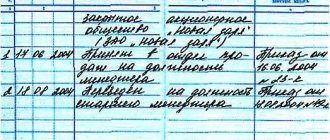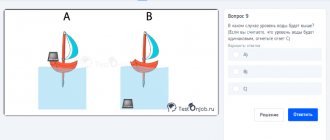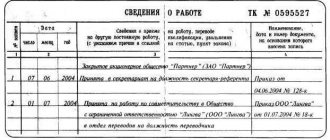What is the essence of a probationary period and why is it needed?
The probationary period is the time when an applicant for a position has not yet been finally accepted into the company’s staff, but has already begun to perform work tasks. The purpose of the test for the employer is to check how well the employee matches the vacancy in terms of his work skills and abilities, and to make sure that he is suitable for the team in terms of personal qualities. For the applicant, the probationary period is also important - he can understand in a short time whether he is able to cope with the assigned tasks and whether the work meets his expectations.
Attention! It is illegal to allow an employee to work without concluding an employment contract with him, even if we are talking only about a probationary period. The law requires that the fact of employment, even during the probationary period, be documented. Otherwise, the employer will face administrative liability and large fines.
Why is an inspection ordered?
The fit test is a period of time during which the benefits of joint collaboration are analyzed. It provides certain benefits for both parties. The purpose of the hiring test is as follows (see table).
Free legal consultation We will answer your question in 5 minutes!
Ask a Question
Free legal consultation
We will answer your question in 5 minutes!
Ask a Question
| For the employer | For the applicant |
| Take a closer look at the applicant, assess the level of experience and knowledge for the proposed position, the degree of ambition, the desire to improve skills, etc. Based on the results of passing the test, they conclude how beneficial the person will be for the organization. | Familiarize yourself with the working conditions and understand whether the payment compensates for the effort expended. A probationary period when applying for a job helps you make a clear decision about the future meaning of collaborating with a particular organization. |
Documentation of the probationary period
As soon as an employee begins to perform his job duties, he is considered to have already been hired. Even if it is just a probationary period and even if there are no written contractual obligations with it.
However, in order to avoid disagreements with the law, the employer should take care of the documentary side of the probationary employment in advance. In particular, the main document regulating the relationship between the organization and the employee for the period of inspection is the employment contract . At the same time, it must certainly contain a section on the probationary period with a clearly defined period and its conditions.
In situations where an employee begins to work without drawing up an employment contract, a separate agreement on a probationary period must be concluded with him in advance, which will subsequently be included in the employment contract.
For your information! If a person started working without a written employment contract or the employment contract does not stipulate a probationary period, the law regards this as the employer hiring the employee without passing a test.
Verbal agreements have no meaning.
The test is not always carried out
Usually, if the employer is completely confident in the qualifications of the new employee, then there is no question of testing. Sometimes employers deliberately lure valuable employees from other organizations. Naturally, in this case the question of a probationary period is not raised - the employee is offered the conditions for which he decides to leave his previous job. But in normal practice, employers do not know how professionally suitable new employees are. Therefore, a trial period of 3 months is a good way out of the situation.
The test is not always carried out. Usually, if the employer is completely confident in the qualifications of the new employee, then there is no question of testing. Sometimes employers deliberately lure valuable employees from other organizations. Naturally, in this case the question of a probationary period is not raised - the employee is offered the conditions for which he decides to leave his previous job. But in normal practice, employers do not know how professionally suitable new employees are. Therefore, a trial period of 3 months is a good way out of the situation.
Registration of a probationary period in a work book: to write or not
The question of whether it is necessary to make an entry about the probationary period in the work book interests many employers.
The law clearly establishes that there is no need to mention a probationary period in the work book; only a record of hiring is made in it, and from the date on which the employee began performing work duties in the verification mode.
The employer must make all the necessary entries in the work book of each employee who has worked for him for more than 5 days, but only if this is a permanent place of work for the person.
Thus, the condition of the probationary period is fixed only in the employment contract.
Results
If an employer decides to hire an employee for a certain position and set him on a probationary period, then the following must be done:
- ask whether the candidate for the position is exempt from the test;
- include a clause on the probationary period in the employment contract, which determines its duration.
The employer has the right to terminate the employment relationship with the subject at any time during the probationary period.
However, with such a decision, you will have to select compelling arguments and documents in favor of early termination of cooperation. Otherwise, there is a risk of litigation. You can find more complete information on the topic in ConsultantPlus. Full and free access to the system for 2 days.
Duration of probationary period
The probationary period cannot be endless and the Labor Code clearly establishes a time limit for checking the suitability of a new employee for the position held - three months, that is, 90 calendar days . After the three-month period, the employer must decide whether he is satisfied with the person or whether it is better to part with him.
But there are exceptions :
- Employees who have entered into an employment contract for a period of 2 to 6 months, as well as those employees who are engaged in seasonal work, are entitled to undergo testing for no more than two weeks;
- Executive employees, for example, directors of organizations, branches and structural divisions, and their deputies, as well as chief accountants and their deputies, can be tested for 6 months;
- officials hired for the first time in the civil service or who have moved from one position to another must work in a probationary mode in a new place for 3 to 6 months.
Important! After making sure that the new employee is completely satisfied with him, the employer can shorten the probationary period. But he has no right to renew it under any circumstances.
It should be remembered that there are certain periods of time that cannot be included in the test period. For example, if:
- the employee was on sick leave;
- was engaged in public or government duties;
- went on short leave without salary;
- was on vacation due to training;
- was actually absent from work for any other valid reasons.
Attention! The probationary period must be included in the length of service, giving him the future right to planned paid annual leave.
Commentary on Article 70 of the Labor Code of the Russian Federation
The hiring test is established in order to check the employee’s business qualities and his suitability for the assigned work. The probationary clause refers to additional terms of the employment contract. It can only be established by agreement of the parties.
If the condition of testing was not agreed upon when concluding the employment contract and was not indicated in the text of the contract, the employee is considered accepted without testing. When an employee is actually admitted to work, the employer is obliged to draw up an employment contract with him in writing no later than three days from the date of actual admission to work. During this period, in our opinion, the test condition can be included, but only if the parties formalized it in the form of a separate agreement before the start of work. Establishing a probationary period unilaterally (by order (instruction) on hiring) is prohibited.
During the probationary period, the employee is subject to the provisions of the Labor Code, laws, other regulatory legal acts, local regulations containing labor law provisions, collective agreements, and agreements. From the meaning of the commented norm it follows that the position of persons hired on a probationary period is no different from the position of other employees. The employee is obliged to obey the internal labor regulations; during this period, the employee can terminate the employment contract at his own request. In turn, the employer has the right to demand that the employee fulfill in full all obligations under the employment contract. If an employee violates labor discipline, such as absenteeism, the employer may terminate the employment contract in compliance with the relevant legal norms.
The commented article defines the circle of persons who are prohibited from establishing a probationary period when hiring. These include persons applying for work through competition for elective positions; minors under 18 years of age; pregnant women; graduates of educational institutions of primary, secondary and higher vocational education, provided that they are entering work for the first time and if this is work in the specialty they received in the relevant educational institution; elected (elected) to an elective position for paid work; those invited to work by way of transfer from another employer by agreement between employers, since such an employee cannot be refused to conclude an employment contract (see Article 64 of the Labor Code and commentary thereto), and persons who have entered into an employment contract for a period of up to two months.
Expansion of the list of workers who are not subject to testing is carried out in accordance with federal laws and collective agreements.
If the probationary condition was established for the person provided for in Part 4 of the commented article, then such a condition of the employment contract is considered invalid. An employee, in the event of his dismissal based on the results of a probationary period, must be reinstated at work, even if the employment contract contained the employee’s consent to establish a probationary period for him.
As a general rule, the trial period cannot exceed three months.
For heads of organizations and their deputies, chief accountants and their deputies, heads of branches, representative offices and other separate structural divisions of organizations (enterprises), the test is set for up to six months. The specific testing period is established by agreement of the parties. The legal deadlines for testing cannot be increased or extended even by agreement of the parties.
When establishing a probationary period, the head of a separate structural unit of an organization (enterprise) must be guided by Art. 55 of the Civil Code (see Article 57 of the Labor Code and commentary to it). A workshop, department, department, sector, etc. is not a separate structural unit of an organization (enterprise), and therefore, increased testing periods cannot be set for the heads of these structural units of an organization (enterprise).
Federal law may establish other test periods. For example, Art. 27 of the Federal Law “On the State Civil Service of the Russian Federation” determined that the probationary period of a civil servant can last from three months to one year, with the exception of the case of transfer of a civil servant from another government body (the probationary period can be set to last from three to six months ). At the same time, the said Federal Law established an exhaustive list in which cases the test is not established:
- for pregnant women - civil servants;
- for citizens who have completed their studies in educational institutions of vocational education and are entering the civil service for the first time in accordance with a training agreement with the obligation to subsequently perform civil service;
- for citizens and civil servants when filling civil service positions in the categories “managers” and “assistants (advisers)”, which are filled for a certain term of office;
- for civil servants appointed to civil service positions by transfer in connection with the reorganization or liquidation of a government body or reduction of civil service positions;
- in other cases provided for by the said Federal Law and other federal laws.
When concluding an employment contract for a period of two to six months, the trial cannot exceed two weeks (for example, when hiring seasonal workers).
Since the test is established in order to verify the employee’s suitability for the work performed and begins its period from the first day of work, the period of temporary incapacity for work of the employee, as well as other periods when he was actually absent from work, performing state or public duties, or was in training, is not included in the probation period. vacation or short-term leave without pay, etc.
Unlike a similar article of the previously existing Labor Code (and in accordance with it, periods of absence from work for valid reasons were not included in the probationary period), within the meaning of Part 7 of the commented article, the probationary period should not include any periods when the employee was actually absent from work, including for unjustified reasons.
During the absence of the employee, the probationary period is interrupted, and after the break, the probationary period resumes and continues. However, the total duration of the test before and after the break cannot exceed the periods established by law.
Payment for the probationary period
By law, work during the probationary period must be paid by the employer, and in exactly the same way as if the employee was already on staff on a permanent basis.
The legislator explains this requirement simply: since work is performed in these two cases equally and in equal importance, then infringement of the rights of an employee on probation will be considered a violation of the law.
However, employers are not always ready to put up with this state of affairs and quite often circumvent this rule. And they do it quite legally too. For example, for the period of a probationary period, an employment contract may be concluded with an employee with a salary specified in it, as if permanent. After passing the test, this employment contract is terminated by mutual consent of the parties and a new one is concluded with a higher salary. Another way: payment of bonuses and additional payments to the organization, depending on the length of service in it.
Is payment taking place?
When hiring an employee, the employer is obliged to provide him with equal pay to other employees in similar positions. Discrimination in determining earnings is unacceptable (Articles 22 and 132 of the Labor Code), which means that during the probationary period, remuneration must be made in full. It is contrary to the law to establish a salary lower than that which will be applied in the event of successful completion of the test.
However, the employer has the opportunity to establish a bonus system based on the total length of service and work experience of employees (Articles 129 and 135 of the Labor Code), which allows the subject to limit the amount of the bonus.
Who has the right not to undergo probation?
There are certain categories of employees who are not required to pass a test when hired. These include:
- women who are expecting a child and have children under three years of age;
- minors;
- those who are transferred from one organization to another by agreement between employers;
- employees appointed to a position after passing a competition in the manner prescribed by law;
- employees under an employment contract valid for up to two months;
- other persons prescribed in the Labor Code of the Russian Federation.
Stage 3. Familiarization with the collective agreement and other acts
Before signing a contract, an employee must be familiar with another almost internal document - a collective agreement (Article 68 of the Labor Code of the Russian Federation). It stipulates the everyday side of working conditions and contains important information about the specifics of paying salaries, the need to take advanced training courses, health care, etc.
Before completing a probationary period, the Labor Code of the Russian Federation obliges the subordinate to familiarize himself with a number of other key acts of the enterprise. They may concern:
- confidentiality of personal data;
- ensuring safe working conditions;
- requirements for the job function (job description);
- customer service standards, etc.
The employer also has the right to draw up a document reflecting the criteria for assessing the employee’s business qualities. These may, for example, include:
- communication skills;
- conscientious attitude to responsibilities;
- availability of the required professional knowledge;
- readiness for regular training;
- responsibility.
Another document that deserves attention is the test plan. It is reflected in internal documents or an employment contract.
Stage 4. Issuing an order
After completing the above, further registration for a probationary period under the Labor Code of the Russian Federation implies the issuance of an order on hiring the employee. It must contain:
- date of enrollment;
- duration of verification for suitability for the position;
- type of work;
- working hours and remuneration;
- other information.
The State Statistics Committee has approved the forms of such an order (T-1 or T-1a), but they can be used at will. The company has the right to develop its own template.
The provisions of the order must not contradict the employment contract (for example, when different hiring dates are indicated). The content must contain information about the purpose of the temporary inspection. The employee must be familiarized with this document against signature no later than three days from the day he began to carry out official assignments.
What to do if a new employee fails the probationary period
If during the testing process it turns out that the employee is not suitable for performing the tasks assigned to his job duties, the management of the enterprise can fire him. Moreover, this must be done during the test period , or, in extreme cases, on its last day. Otherwise, the employee will be considered to have successfully completed the test.
Important! During the probationary period, the employer should closely monitor how the employee completes the tasks given to him. If they are untimely or of poor quality, this must be recorded (for example, in official memos and memos). In the future, if events develop unfavorably, scrupulous documentary support of the test will facilitate the collection of evidence to justify the dismissal of an employee who failed the test.
The employee must be notified of the impending dismissal at least three days in writing. The notification must necessarily indicate the reasons why it is believed that the employee did not pass the test, as well as attach documents confirming them.
To summarize, we can draw the following conclusion: the probationary period is the time when, despite particularly close attention from the employer, the new employee has all the rights and responsibilities of employees on a permanent basis. You need to approach the registration of a probationary period in strict accordance with the requirements of the law - this will allow you to avoid claims in the future, both from the staff and from the controlling structures.
What documents does the employer need to prepare?
The condition of the test itself and its duration must be indicated in the employment order.
REMEMBER: For most applicants for the position, the maximum possible length of probation is three months. The employer also has the right to set a period shorter than this. But if the employment contract and the order itself stipulate a trial period of two months, then it will no longer be possible to extend it to three months without the consent of the employee himself. This is due to the fact that the probationary clause refers to the essential terms of the employment contract, which can only be changed as a result of agreement of the parties.
The next stage of assigning a test is the preparation of tasks for the probationary period, as well as the development of those conditions that will allow the applicant to be considered as having passed the test. Such documents must either be announced or handed over to the employee. This must be done with a signature. It must be remembered that tasks and conditions cannot allow for ambiguity and subjectivity. They need to be formulated precisely and clearly.
During the entire probationary period, the employer must strictly monitor the employee’s performance of these tasks. If they are performed poorly or untimely, then these facts must be recorded (for example, in reports or memos). It is worth clearly indicating what task was given and what exactly was not done, etc. It would not be amiss to include the task itself.
If the employee was given any additional tasks, this must also be indicated in writing. It is better to give the task with a signature that the task has been received and is clear.
Proper design of the test is quite complex and has many nuances. Every action must be recorded in writing. This will make it possible in the future to have evidence that the employee did not pass the test, which means he can be fired.
If the test is passed...
Art. 71 of the Labor Code of the Russian Federation establishes that if the probationary period has ended, and the employee still continues to carry out work activities, then he is considered to have passed the test. From this provision it follows that if the test is passed, the employer may not notify the employee about this. But in practice, it would be better to notify the employee. Such a notice will undoubtedly set the employee up for further successful performance of his activities. And for the employer, this is a good opportunity to innocuously indicate which aspects of the job should be given more attention.











